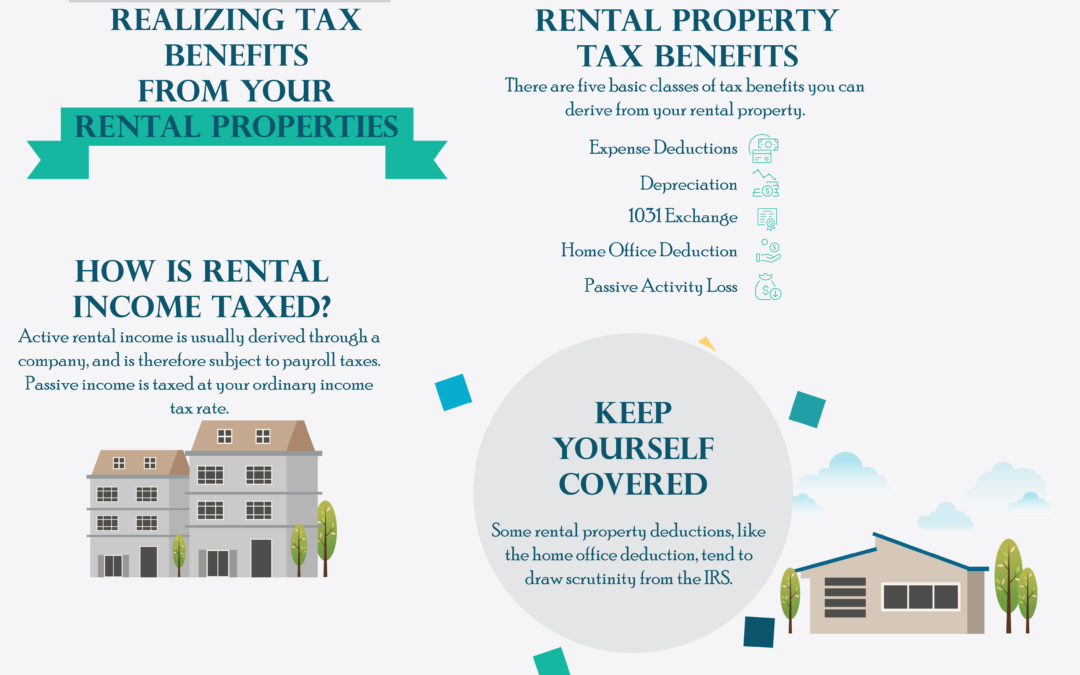Rental properties can be a great source of reliable income, but the tax rules relating to them are numerous, complex and confusing.
Even though the IRS considers rental properties as a passive source of income, they often demand a lot of work and money, which means you could end up with thousands of dollars of lost income. We don’t want you to miss a cent of what you’re entitled to, so let’s talk about the tax benefits of rental properties and help you steer clear of potential pitfalls.
Rental Property Tax Benefits
There are five basic classes of tax benefits you can derive from your rental property.
- Expense Deductions: You can deduct ordinary and generally accepted expenses associated with your rental property, such as mortgage interest (only the interest, not the premium), property taxes, insurance premiums, repairs, utilities, legal expenses, travel expenses and maintenance. This includes all the things you would expect to be able to deduct.
- Depreciation: You can’t depreciate land, but you can depreciate a rental property. The most common depreciation is the Modified Accelerated Cost Recovery System (MACRS), which allows you to deduct the cost of the property over 27.5 years for residential rental properties and 39 years for commercial rental properties
- 1031 Exchange: If you sell a rental property that has appreciated in value, you may be subject to capital gains tax. Fortunately, you can offset this tax liability by using the proceeds from the sale to invest in another rental property through a 1031 exchange.
- Home office deduction: If you use a portion of your rental property as a home office, you may be able to deduct expenses related to that space, such as utilities, rent and repairs. The amount of deduction is based on the percentage of space you’re using.
- Passive activity losses: If you own rental properties as a passive investor, you may be able to deduct losses from your rental properties against your other sources of income, subject to certain limitations.
Keep Yourself Covered
Some rental property deductions, like the home office deduction, tend to draw scrutiny from the IRS. And as we’ve mentioned before, the IRS are better funded and staffed right now than they have been in a long time. Be sure to keep detailed records of all income and expenses to both maximize your tax benefit and cover yourself in case the IRS asks questions. It may also be wise to consult with a tax professional who can help you navigate the complexities of rental property tax laws.
Passive Activity Losses
Let’s circle back to passive activity losses for a minute, because these rules can be confusing.
The IRS considers all real estate investment to be passive with a few exceptions. We’ll come back to those.
Generally, you’re not allowed to deduct passive income from non-passive income. You can only deduct losses from income with which you are materially involved, which, according to IRS Topic No. 425, is involvement in the operation of a trade or business activity on a “regular, continuous, and substantial basis.”
You may be wondering what rental properties would be considered active or passive?
Active real estate income is generated by developing, fixing and flipping properties.
Passive income is generated from buy-and-hold investments. Owning a rental property and collecting rental income is considered passive—not active—in most cases.
Other examples of passive income include owning shares of a real estate investment trust (REIT) and participating as a silent partner in a real estate syndication or limited liability company (LLC).
Back to those exceptions I mentioned earlier. Ordinarily, you can’t deduct passive activity losses from your income unless you meet one of the following exceptions:
- If your modified adjusted gross income is under $100,000, you might be able to deduct up to $25,000 of rental losses if you’re actively involved in managing the rental and have at least 10% ownership.
- If you’re a qualified real estate professional who materially takes part in rental operations, work at least 750 hours annually in real estate and over 50% of your work is in the real estate business.
- If your property is rented to a company, such as an LLC or S corporation.
- If your Rental income is from short-term rentals (STRs) where the average period of a tenant’s stay is 7 days or fewer.
- If your rental income is from a residence occupied as a personal residence for more than 14 days or 10% of the days the home is rented out.
Let’s take a couple of examples.
If you make $85,000 dollars a year and have a $20,000 rental property loss you’re in luck. You fall under the $100,000 cutoff and are able to apply the loss against your income.
If you make $250,000 dollars a year and have a $10,000 rental property loss you’re on the hook for the whole $10,000. You’ll have to qualify for the exceptions mentioned above, generate more income from the property or sell it to make up the loss.
How is Rental Income Taxed?
Active rental income is usually derived through a company, and is therefore subject to payroll taxes. Passive income is taxed at your ordinary income tax rate.
The Bottom Line
You can see that tax laws related to rental properties can be complicated, and we’ve only scratched the surface here. All of the strategies mentioned above have specific requirements and limitations making it difficult to determine which ones are best for your specific situation. We highly recommend that you consult with a tax professional to help you identify and implement the best strategies for you and your bank account.


